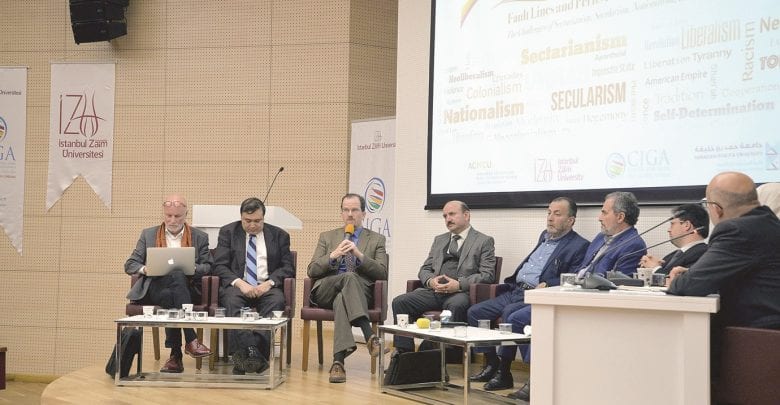
International conference on Muslim Ummah held
«جامعة حمد» تناقش أسباب تراجع الأمة الإسلامية
DOHA: Hamad Bin Khalifa University’s (HBKU) College of Islamic Studies (CIS) recently co-led the Second International Conference on the Muslim Ummah, which was held on October 14-16 this year, with leading academics and scholars of their field convening in Istanbul to deliberate, present, and discuss issues of wide-ranging importance and applicability.
The conference was organized by the Center of Islam and Global Affairs (CIGA) of Istanbul Sabahattin Zaim University (IZU) in cooperation with College of Islamic Studies (CIS), and the Center for Muslim-Christian Understanding (ACMCU) at Georgetown University in Washington, D.C.
The three-day conference subscribed to the theme of “Fault Lines and Perils Facing Muslim Societies: The Challenges of Sectarianism, Secularism, Nationalism, and Colonialism.” The purpose of the conference centered on debating some of the most significant fault lines impeding the development and progress of Muslim societies today and explored appropriate responses to these challenges.
The responses were presented against a backdrop of declining wealth and power, strategic weaknesses, and political disintegration across Muslim-majority countries, posing questions about the challenges that Muslim societies must contend with from a vastly disadvantaged position.
Commenting on the conference’s outcomes, Dr. Emad El-Din Shahin, dean of CIS, said: “We value our partnership with IZU, one of the premier centers of Islamic academia, and are proud of our successful collaborations within just one year of our joint efforts. This cooperation will continue to build vital opportunities for academic enrichment, synergetic scholarship, and thought leadership advancement across our specializations in contemporary and applied Islamic Studies.” Dr. Louay Safi, professor of public policy at CIS, represented the college in the conference’s opening remarks, where he welcomed participants from diverse academic backgrounds and provided an overview of CIS’s catalog of uniquely selected graduate programs.
“The conference examined current challenges confronting Muslim societies, and provided a platform to share ideas on possible approaches to address them,” Dr. Safi noted.
During the course of the conference, Dr. Joseph Lumbard, associate professor of Qur’anic Studies at CIS, as well as Dr. Safi, provided their viewpoints on the session discussing the role of religion in society. Dr. Lumbard, from the lens of “Islam and Postmodernity: A View from Traditional Epistemology,” argued that many Muslims are complicit in undermining their own traditions, adhering to the sovereignty of modern Euro-American epistemology – they do not use the tools of analysis within the framework of Islamic epistemology.
The Muslim Ummah Conference is one of the several outcomes of the four-year Memorandum of Understanding signed between HBKU-CIS and IZU last year. The partnership aims to facilitate graduate-level education, exchange students and faculties, conduct collaborative research projects, and jointly organise research symposia and conferences.
شاركت كلية الدراسات الإسلامية بجامعة حمد بن خليفة، مؤخراً، في رئاسة المؤتمر الدولي الثاني حول الأمة الإسلامية، الذي عقد بمدينة اسطنبول التركية.
استعرض المؤتمر -الذي أقيم بمركز الإسلام والشؤون العالمية بجامعة صباح الدين زعيم في اسطنبول، بالتعاون مع كلية الدراسات الإسلامية، ومركز التفاهم الإسلامي المسيحي بجامعة جورجتاون في واشنطن- عدة قضايا ذات أهمية كبيرة على مدار 3 أيام، تحت شعار: «خطوط الصدع والأخطار التي تواجه المجتمعات الإسلامية: التحديات الناجمة عن الطائفية والعلمانية والقومية والاستعمار».
وترَّكَز الغرض من هذا المؤتمر حول مناقشة بعض خطوط الصدع التي تعوق تطور المجتمعات الإسلامية، ودراسة الاستجابات المناسبة لتلك التحديات، وبحث أسباب الضعف والتفكك السياسي في الدول ذات الأغلبية المسلمة، والتساؤلات بشأن التحديات التي يتعين على المجتمعات المسلمة التعامل معها من موقع ضعف.
وقال الدكتور عماد الدين شاهين، عميد كلية الدراسات الإسلامية: «نقدر شراكتنا مع جامعة صباح الدين زعيم، أحد المراكز الرائدة للدراسات الإسلامية الأكاديمية، ونفخر بتعاوننا الناجح في غضون عام واحد فقط من جهودنا المشتركة». وأضاف: «سوف يستمر هذا التعاون في إيجاد فرص حيوية للإثراء الأكاديمي، وإجراء الدراسات التعاونية، والتقدم في قيادة الفكر عبر تخصصاتنا في الدراسات الإسلامية المعاصرة والتطبيقية».
ومثَّل الدكتور لؤي صافي -أستاذ السياسة العامة- كلية الدراسات الإسلامية في المؤتمر، حيث ألقى الكلمة الافتتاحية التي رحب فيها بالمشاركين من مختلف الخلفيات الأكاديمية، وقدَّم لمحة عامة عن قائمة برامج الدراسات العليا المختارة بعناية التي تقدمها الكلية.
وطرح الدكتور جوزيف لومبارد، أستاذ الدراسات القرآنية المشارك بكلية الدراسات الإسلامية، والدكتور لؤي صافي، آراء في الجلسة التي ناقشت دور الدين في المجتمع، ومن منظور «الإسلام وما بعد الحداثة»، حيث أكد لومبارد أن العديد من المسلمين متواطئون في تقويض تقاليدهم الخاصة، إذ يلتزمون بسيادة نظرية المعرفة الأوروبية الأميركية الحديثة، ولا يستخدمون أدوات التحليل في إطار عمل نظرية المعرفة الإسلامية.
وعرض الدكتور لؤي صافي وجهة نظره من منظور «الشريعة والدولة القومية: الحكم، والقانون، والمجتمع»، لافتاً إلى أنه يتعين إعادة تأطير الشريعة كمنظومة للقيم بعيداً عن دورها الحالي كأداة من أدوات الدولة، وأعاد التأكيد على الحاجة للتوصل إلى اتفاقية تعاون حول تطبيق الشريعة، وضرورة تحمل المسؤولية عن استخدامها».
ويُعد مؤتمر الأمة الإسلامية من النتائج المتعددة لمذكرة التفاهم التي وقعتها كلية الدراسات الإسلامية بجامعة حمد بن خليفة مع جامعة صباح الدين زعيم خلال العام الماضي، وتستمر لمدة 4 سنوات. وتهدف الشراكة إلى تيسير التعليم على مستوى الدراسات العليا، وتبادل الطلاب وأعضاء هيئة التدريس، والتعاون في إجراء المشاريع البحثية، والاشتراك في تنظيم المنتديات والمؤتمرات البحثية.;



